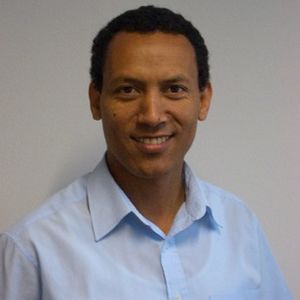Waltenegus Dargie
Waltenegus Dargie (born on 24 May 1969 in Neghelle Borena) is an Ethiopian-born researcher and writer. He has published several novels as well as philosophical and technical books, including THE REASON FOR LIFE, ERMIAS
Early Life
Dargie was born in Neghelle Borena.[1] His father was a military doctor and his mother was a house wife. He was the fourth child and has five brothers and one sister. Because of his father's profession the family changed places frequently until he was thirteen. Then the family settled in Neghelle Borena following the retirement of the father from the military.
Dargie attended a missionary elementary school, but when he was ten years old, his mathernal grandfather died and he and his elder brother were send to Ancharo to live with their grandmother. The grandmother had several cattles and a horse and it was there in Ancharo where Dargie learned horse riding. One of the chapters in Ermias[lower-alpha 1] partly reflects his childhood life in Ancharo. After living in Ancharo for two years the brothers returned back to Neghelle Borena to attend Junier High School.
Dargie took the Ethiopian School Leaving Examination in 1987 and joined the Kotobe College of Teachers Education to study Electrical Technology[1] where he won Poem of the Year award in 1988, as Professor Richard Pankhurst observes in his preface to The Eunuch and the King's Daughter, Neshee Publication (2005), p.9-10}}
Professional Life
After graduating with Diploma in June 1989[1], Dargie moved to Tepi to teach Electrical Technology at the Tepi High School. In a lecture delivered at the Institute of English and American Studies (TU Dresden) at the TU Dresden, Dargie stated that much of his time in Tepi was spent in reading philosophical books.[2] In the same lecture he mentioned that after having been an Atheist, he became a Christian in August 1992 at the age of 23.
In September 1994 Dargie resigned from his post to study Electrical and Electronics Technology at the Nazareth Technical College (a.k.a Adama University), obtaining a Bachelor's Degree with distinction three years latter in August 1997.[1] [3] That same year he joined the Defence Engineering College in Debre Zeit (a.k.a Bishoftu) as an Assistant Lecturer.
Three years latter Dargie resigned from his post and moved to Germany to pursue a Master's Degree in Electrical Engineering at the University of Kaiserslautern. He completed his study in July 2002[1][3] and moved to Kassel to take up a researcher position at the Department of Electrical Engineering and Computer Science at the University of Kassel.[3] During this time (2002-2005), Dargie and his family lived in Göttingen, Dargie commuting to work daily.
In June 2006 Dargie obtained a PhD from the TU Dresden[1] Faculty of Computer Science with magna cum laude[lower-alpha 2] and joined the Chair of Computer Networks as a full time researcher.[4] In 2010 Dr. Dargie obtained a Habilitation from the TU Dresden[1], the highest academic title in Germany.
Hobby
Dargie is a regular runner. His preferred distance is half-marathon. He regularly participates in the Ober-Elbe Marathon[lower-alpha 3] in Dresden, Germany.[5]
Books By Waltenegus Dargie
Technical Books
Fundamentals of Wireless Sensor Networks: Theory and Practice[6]
Principles and Applications of Ubiquitous Sensing[7]
Novels
The Eunuch and the King's Daughter[8]
Philosophical Books
Notes
- ↑ Ermias, Book II, ch. 2
- ↑ en
.wikipedia .org /wiki /Latin _honors - ↑ de
.wikipedia .org /wiki /Oberelbe-Marathon
In the media
External links
- Waltenegus Dargie - Amazon.com
- Waltenegus Dargie - Google Scholar Citations
- Dr. Waltenegus Dargie's Home Page - TU Dresden
- Waltenegus Dargie - IEEE Xplore Author Details
References
- ↑ 1.0 1.1 1.2 1.3 1.4 1.5 1.6 Online CV: Dargie, W., TU Dresden (January 10, 2020)
- ↑ "Dargie, W., The Reason for Life, Invited lecture delivered to PhD students and staff, TU Dresden, Intitute of English and American Studies (12 December 2017)"
- ↑ 3.0 3.1 3.2 ResearchGate (March 13 2020)
- ↑ "TU Dresden, Faculty of Computer Science, Institute of System Architecture"
- ↑ "12. RENTA Oberelbe-Marathon, Dresden (2012)"
- ↑ "Misra, S., Book reviews for: Fundamentals of Wireless Sensor Networks: Theory and Practice (Dargie, W. and Poellabauer, C.), IEEE Wireless communications, 20(66), 2013"
- ↑ "Shea, John J. Book Reviews, IEEE Electrical Insulation Magazine, 33(5), 2017"
- ↑ "Tucker Lieberman, An Ethiopian princess seeks help in 'The Eunuch and the King's Daughter', DISRUPTIVE DISSERTATION, (October 13, 2012)"
This article "Waltenegus Dargie" is from Wikipedia. The list of its authors can be seen in its historical. Articles taken from Draft Namespace on Wikipedia could be accessed on Wikipedia's Draft Namespace.
